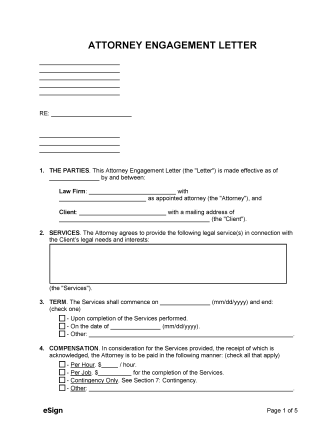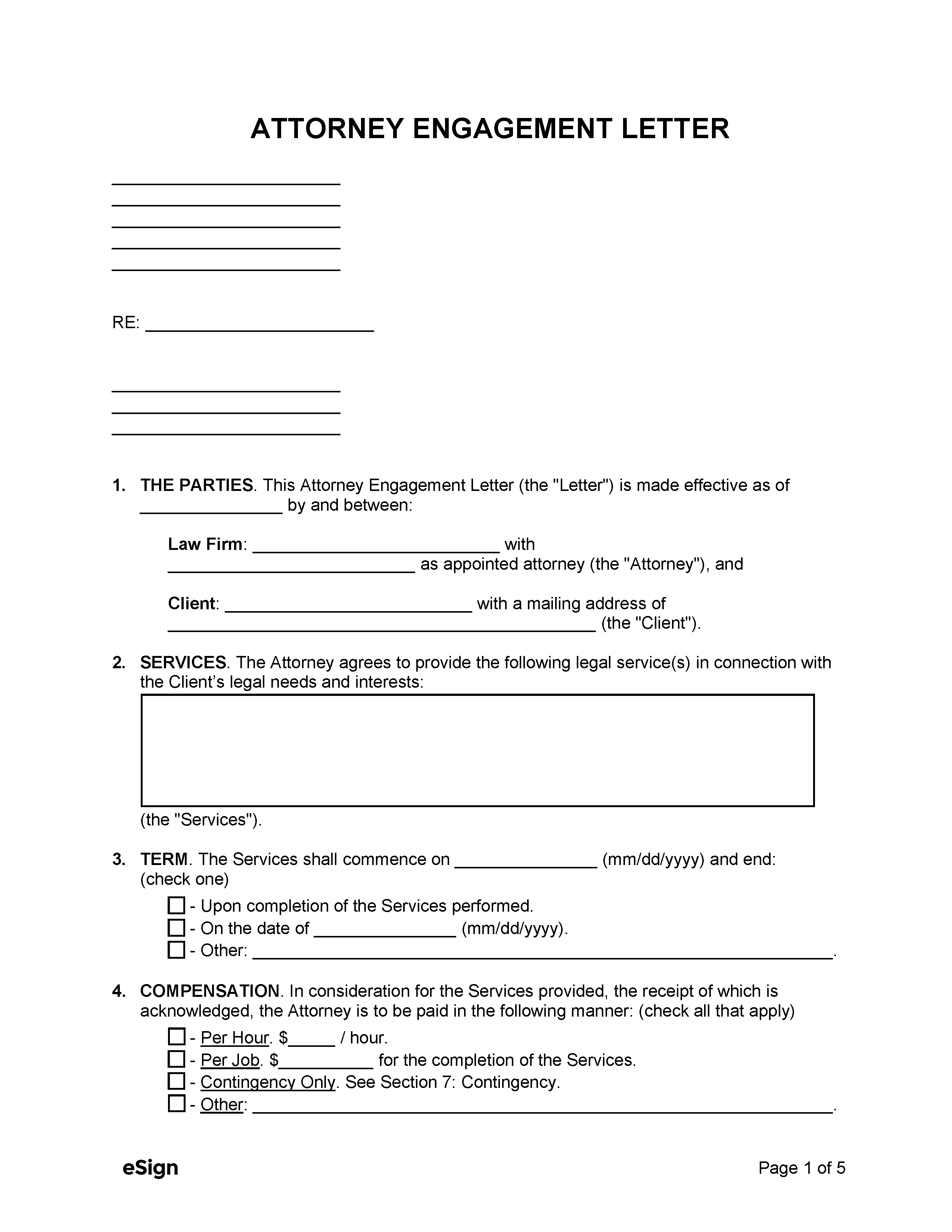Purpose of an Engagement Letter
Legal Requirements
Even in cases where attorneys are not legally obligated to execute engagement letters, most do so to maintain best management practices and avoid legal issues. The American Bar Association states that the scope of representation and legal fees “shall be communicated to the client, preferably in writing.”[1]
In some instances, an engagement letter is legally required, and lawyers should ensure they are current with their state’s requirements regarding written disclosure of legal fees and expenses.
What’s Included
Legal Services
The attorney should describe the legal services they will be performing for their client. Identifying tasks that won’t be included in their representation can also help clarify the attorney’s role.
Fees and Expenses
An engagement letter must include the attorney’s fees, how payments are to be made, and any associated costs.
Contingency Arrangement
If the parties decide that the attorney’s compensation is conditional upon a certain outcome, they will need to sign off on this in the letter.
Retainer
The attorney may decide to charge a retainer fee, an upfront payment made by the client to secure the lawyer’s services. The attorney will only have access to the money once they start working for their client.
Confidentiality
Confidentiality, or attorney-client privilege, guarantees that the lawyer will not share any information they obtain from their client with any other party. This right is protected by law and the lawyer will face serious professional consequences if violated, including potential disbarment.
Sample
Download: PDF, Word (.docx), OpenDocument
ATTORNEY ENGAGEMENT LETTER
[ATTORNEY NAME]
[ATTORNEY TITLE]
[LAW FIRM NAME]
[LAW FIRM STREET ADDRESS]
[LAW FIRM CITY, STATE, ZIP]
RE: [LETTER SUBJECT]
[RECIPIENT NAME]
[RECIPIENT STREET ADDRESS]
[RECIPIENT CITY, STATE, ZIP]
1. THE PARTIES. This Attorney Engagement Letter (the “Letter”) is made effective as of [MM/DD/YYYY] by and between [CLIENT NAME], with a mailing address of [CLIENT ADDRESS] (the “Client”), and [LAW FIRM NAME] with [ATTORNEY NAME] as appointed attorney (the “Attorney”).
WHEREAS the Client intends to pay the Attorney for Services provided under the following terms and conditions:
2. SERVICES. The Attorney agrees to provide the following Service(s): [LIST SERVICE(S)] (the “Services”).
3. COMPENSATION. In consideration for the Services provided, the Attorney is to be paid in the following manner: [DESCRIBE COMPENSATION].
In addition, the Client may be charged for any administrative fees, filings, or other costs directly or indirectly related to the Services.
4. RETAINER. The Client is: (check one)
☐ – Not required to pay a retainer.
☐ – Required to pay the Attorney a non-refundable retainer of $[AMOUNT], due every ☐ week ☐ month beginning on [DATE].
5. TERM. The Services shall commence on [MM/DD/YYYY] and terminate upon either party providing [#] days of written notice to the other.
6. ADDITIONAL TERMS. [LIST ADDITIONAL TERMS (IF ANY)].
IN WITNESS WHEREOF, the Client and Attorney agree to the terms and conditions contained in this Letter.
Client’s Signature: ______________________ Date: [MM/DD/YYYY]
Client Printed Name: [PRINTED NAME]
Attorney’s Signature: ______________________ Date: [MM/DD/YYYY]
Attorney Printed Name: [PRINTED NAME]

